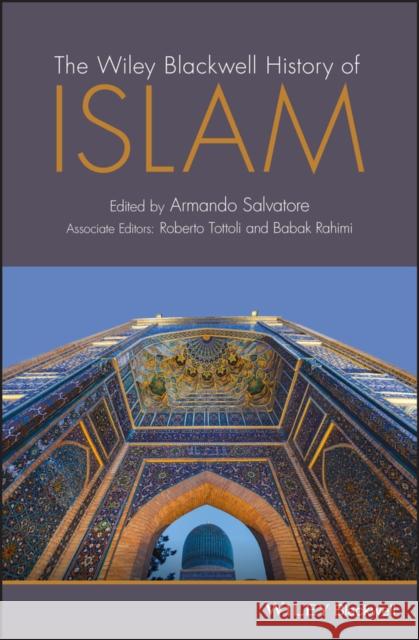The Wiley Blackwell History of Islam » książka



The Wiley Blackwell History of Islam
ISBN-13: 9780470657546 / Angielski / Twarda / 2018 / 688 str.
The Wiley Blackwell History of Islam
ISBN-13: 9780470657546 / Angielski / Twarda / 2018 / 688 str.
(netto: 669,69 VAT: 5%)
Najniższa cena z 30 dni: 697,42
ok. 30 dni roboczych.
Darmowa dostawa!
A theoretically rich, nuanced history of Islam and Islamic civilization with a unique sociological component This major new reference work offers a complete historical and theoretically informed view of Islam as both a religion and a sociocultural force.
List of Contributors ix Preface xv Introduction: The Formation and Transformations of the Islamic Ecumene 1 Armando Salvatore, Johann P. Arnason, Babak Rahimi, and Roberto Tottoli Part I Late Antique Beginnings (to ca. 661) 37 1 Agrarian, Commercial, and Pastoralist Dynamics in the Pre Islamic Irano Semitic Civilizational Area 39 George Hatke 2 Imperial Contests and the Arabs: The World of Late Antiquity on the Eve of Islam 59 Isabel Toral Niehoff 3 Pre Islamic Patterns of Social Organization and Cultural Expression in West Central Arabia 77 Mohammed A. Bamyeh 4 Muhammad s Movement and Leadership 97 Anna Ayse Ak asoy Part II The High Caliphate (ca. 661 946) 115 5 The Trajectory of the High Caliphate: Expansion and Contraction 117 Amira K. Bennison 6 Developments within the Religious Sciences during the Rise and Decline of Empire 137 Devin Stewart 7 Shi is, Sufis, and Popular Saints 159 Ahmet T. Karamustafa 8 Contested Fields, Knowledge Mobility, and Discipline Crystallization 177 Paul L. Heck Part III The Earlier Middle Period (ca. 946 1258) 195 9 Cosmopolitan Expansion and the Fragmentation of Governance 197 Amira K. Bennison 10 Scholarship, Speculative Thought, and the Consolidation of Sunni Authority 215 Bruce Fudge 11 Alternative Patterns of Legitimacy: Sunni Shi i Debates on Political Leadership 235 Asma Afsaruddin 12 The Crystallization and Expansiveness of Sufi Networks within the Urban Rural Nomadic Nexus of the Islamic Ecumene 253 Babak Rahimi and Armando Salvatore Part IV The Later Middle Period (ca. 1258 1453) 273 13 Pax Mongolica and its Impact on Patterns of Governance 275 Michele Bernardini 14 Religious Knowledge between Scholarly Conservatism and Commoners Agency 291 Caterina Bori 15 The Consolidation of Sunni and Shi i Legitimacies 311 Babak Rahimi 16 Organizational Patterns and Developments within Sufi Communities 329 Devin DeWeese Part V Early Modernity and Civilizational Apogee (ca. 1453 1683) 351 17 Early Modern Islamicate Empire: New Forms of Religiopolitical Legitimacy 353 Matthew Melvin Koushki 18 The Ulama as Ritual Specialists: Cosmic Knowledge and Political Rituals 377 A. Azfar Moin 19 New Sociopolitical Formations and the Renaissance of Philosophy 393 Sajjad Rizvi 20 The Apogee and Consolidation of Sufi Teachings and Organizational Forms 413 Rachida Chih Part VI Facing the Global Rise of European Power (ca. 1683 1882) 433 21 Global Transformations in the Muslim World : Connections, Crises, and Reforms 435 Ali Yaycioglu 22 Intellectual Creativity in a Time of Turmoil and Transition 459 Ethan L. Menchinger 23 Islamicate Knowledge Systems: Circulation, Rationality, and Politics 479 Jane H. Murphy 24 From Saints and Renewers to Mahdis and Proto Nationalists 499 John O. Voll Part VII Colonial Subjection and Postcolonial Developments (ca. 1882 present) 519 25 Struggles for Independence: Colonial and Postcolonial Orders 521 SherAli Tareen 26 The Ulama : Challenges, Reforms, and New Patterns of Social Relevance 543 Jakob Skovgaard Petersen 27 The Role of Intellectuals within Late Colonial and Postcolonial Public Spheres 561 Mohammed A. Bamyeh and Armando Salvatore 28 The Sociopolitical Entanglements of Sufism 585 Jamal Malik Index 607
ARMANDO SALVATORE is the Keenan Chair in Interfaith Studies and a Professor of Global Religious Studies (Society and Politics) at the School of Religious Studies, McGill University.
ROBERTO TOTTOLI is a Professor of Islamic Studies at the Department of Asian, African, and Mediterranean Studies, University of Naples "L′Orientale."
BABAK RAHIMI is an Associate Professor of Communication, Culture, and Religion at the Department of Literature, University of California, San Diego.
This major new reference work offers an historical and theoretically informed view of Islam as both a religion and a sociocultural force. Uniquely comprehensive, it surveys and discusses the transformation of Muslim societies in different eras and various regions, providing a broad narrative of the historical development of Islamic civilization.
The volume provides an in–depth study of the diverse ways through which the religious dimension at the core of Islamic traditions has led to a distinctive type of civilizational process in history. The book illuminates the ways in which various historical forces have converged, clashed, and crystallized in institutional forms at a variety of levels, embracing social, religious, legal, political, cultural, and civic dimensions. Together, the team of internationally renowned scholars move from an exploration of the genesis of a new social order in 7th–century Arabia to an examination of the rise of revolutionary Islamist currents in the 20th century and the varied ways in which Islam has grown and continues to pervade daily life in the Middle East and beyond.
The Wiley Blackwell History of Islam is essential reading for students and academics in a wide range of fields, including sociology, history, law, and political science. This book will also appeal to general readers with an interest in the history of one of the world′s great religions.
1997-2026 DolnySlask.com Agencja Internetowa
KrainaKsiazek.PL - Księgarnia Internetowa









